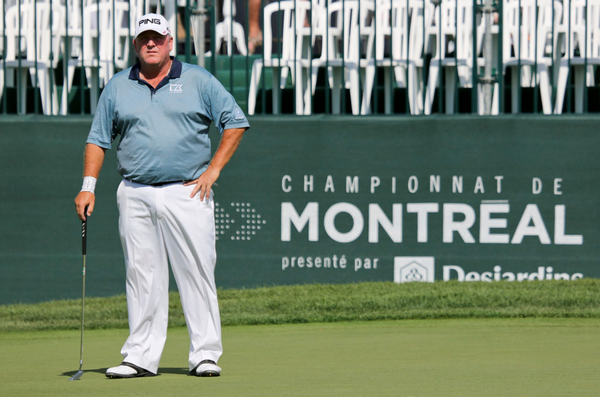
via Imago
Image Courtesy: Flickr

via Imago
Image Courtesy: Flickr
Is PGA of America unfair? Veteran golfer Mark Calcavecchia has accused the association of treating him differently and unfairly after he withdrew from the KitchenAid Senior, the second senior major tournament. Calcavecchia expressed his dissatisfaction and disappointment in a tweet that has since generated a lot of discussion and controversy within the sport.
The renowned golfer Mark Calcavecchia, who has won multiple championships and honors, has recently battled severe health issues. “Welp the @PGA screwed me. Langer got a cart. Not me. Nothing against Langer. Love the guy. He’s got repaired Achilles and came back too soon. I get it. I’ve got repaired back and knees. No cart for me. What’s the difference @PGA,” Calcavecchia tweeted, highlighting the apparent bias in the PGA’s decisions regarding the use of carts for players with medical conditions.
In his tweet, he referred to Bernhard Langer, another senior golfer who just underwent Achilles surgery and was given permission to utilize a golf cart. Calcavecchia, who has had knee and back surgery, was not given the same accommodations.
ADVERTISEMENT
Article continues below this ad
Welp the @PGA screwed me. Langer got a cart. Not me. Nothing against Langer. Love the guy. He’s got repaired Achilles and came back too soon. I get it. I’ve got repaired back and knees. No cart for me. What’s the difference @PGA
— Mark Calcavecchia (@MarkCalc) May 24, 2024
Mark Calcavecchia’s return to competitive golf is evidence of his resolve and determination. Calcavecchia’s problems started when he got COVID-19, an illness that left him with chills, body aches, and a loss of taste and smell. When he returned, he was quite weak and exhausted and needed hospital treatment.
His back problems ultimately resulted in a double spinal fusion operation on the L4 and L5 vertebrae. The long road to recovery included extreme nausea and dizziness brought on by low blood pressure, which ultimately resulted in a blackout that led him to tumble and seriously injure himself. Throughout his recovery, Calcavecchia was dependent on a walker to keep his mobility. Calcavecchia persevered and made his way back to the golf course in spite of these obstacles. This brings up a larger debate about the issuing of golf carts at PGA of America events.
Golf cart troubles for PGA of America
ADVERTISEMENT
Article continues below this ad
Golf cart use in professional competitions has its roots in the landmark Casey Martin case. Martin filed a lawsuit against the PGA Tour in 2001, claiming he was entitled to use a cart under the Americans with Disabilities Act (ADA) due to a lifelong blood circulation problem that affected his leg. The matter proceeded to the Supreme Court, where Martin eventually prevailed. Critics at the time said that walking was a necessary component of the game, but Martin proved to be an uncommon exception, decreasing their concerns about widespread cart use.
This problem is further complicated by Mark Calcavecchia’s circumstances. Following his battle with COVID-19 and his double spinal fusion surgery, Calcavecchia has experienced severe physical limitations. The PGA of America turned down, or rather ignored his request for a cart at the senior major even though he had recently undergone surgery and had a documented medical history.
A wider conversation over consistency and fairness in the PGA’s policy implementation has been sparked by this incident. Even though the Americans with impairments Act (ADA) requires reasonable accommodations for those with impairments, there is disagreement over what exactly qualifies as a disability in the context of professional golf.
ADVERTISEMENT
Article continues below this ad
For the sake of justice and openness, the PGA of America’s response to cart demands has to be closely examined. Establishing clearer criteria and perhaps involving an independent medical panel to assess these requests could help minimize accusations of bias and inconsistency. The effective operation of the game also depends on the organizers and players having clear communication.
The experience of Mark Calcavecchia highlights the necessity of a fair strategy that honors the players’ health demands as well as the history of the game. Finding solutions that preserve the spirit of the game while giving essential concessions to those who genuinely need them is still critical as the golfing community continues to debate this matter.
ADVERTISEMENT
ADVERTISEMENT
ADVERTISEMENT


